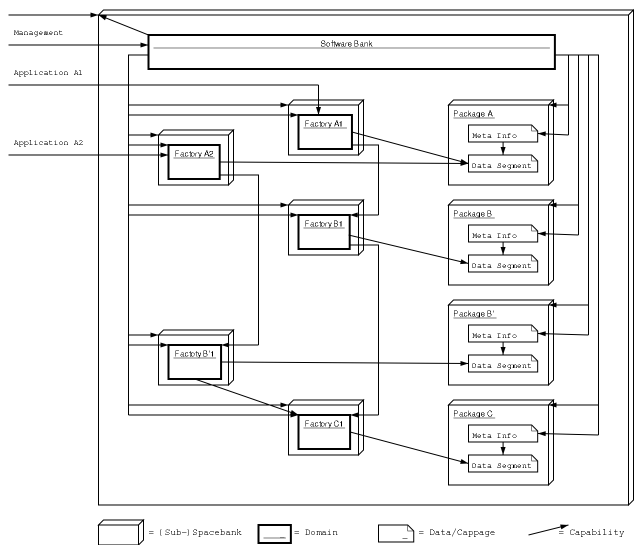Package handling in capability based systems
>> Thoughts on package handling in capability based
systems
There are may reasons why current software systems
are not sufficient reliable. A crucial factor is software
integrity:
Todays applications are build from multiple software modules,
libraries or what ever you call them. Each time a new software
package gets installed, there are new or updated modules
available. Usually updated modules simply replace the old ones --
all applications former using the old version are now forced to
use the new one. This often leads to reliability problems.
I think applications should stay unaffected using their old
version until someone explicit updates them to use the new one.
Of course "updateing" (relinking a application to other
subsystems) should be fast and always possible without the need
to insert the installation media.
Talking about capability based systems like EROS, which naturally don't have a
global namespace where all software gets installed, there seems
to be a obvious way to impement this:
Let there be a service which handles all the required dependency
resolution, builds factories on request and links them as
requested by the user. This service may not expose write
access to packages or factories used by other factories. In fact
it should never expose factory capabilities which allow much more
than "request product" and "are you
confined?".
The following diagram shows what the internal state of such
SoftwareBank could look like after 4 packages had been
installed.
The 4 packeges contained a least the following meta data:
- PackageName: "C"
Provides: C
Depends on:
- PackageName: "B"
Provides: B
Depends on: C
- PackageName: "B'"
Provides: B
Depends on: C
- PackageName: "A"
Provides: A
Depends on: B
When installing package "A", the user will have to be asked
to which B factory the A factory should be linked. The
diagramm assumes package "A" had been linked two times -- once to
"B", once to "B'".

There's an important concept not shown in the figure:
Sub-Softwarebanks.
There should be the possibility to create a read-only version of
a software bank. This bank could be used by further software
banks to inherit software: an easy way to seperate
access to the systems TCB- and application installation space; or
to give users the ability to install their own software. ...
to be continued ...
Please note:
- By package i think of a template for a single class of
factories. Generally, a aplication will come with a herd of
packages.
Maybe the terminology needs rethinking :)
- I omitted some dependencies: all factories of course depend
on their metafactory. But it's not the normal "depends
on" relation. Its more a "is running instance of"
relation. See issue (4).
- Updating
I think updating linked factories is a really bad idea. The
normal update path should be:
- install new packages
- successive build new factories and link them to the new
packages.
- if everything worked as expected, delete old
factories.
- Recinding factories or packages
is not as trivial as it seems: we cannot know whether there are
products running build by the factory.
Maybe there is a need to implement a
running_instances_counter . But this would imply to
poke a hole into all factories. brrr
Rescinding becomes even more interesting if you consider having
SubSoftwarebanks.
I have some ideas ... to be continued ...
- Should factories have their own copy of their data
segment?
This is closely releated to issue (4): the question is: should
all products die when their factory is rescinded? (I think
so)
Or shall they continue until the package is removed?
- Should factories have access to their package meta
data?
Should factories by default be able to answer questions like:
"Whats the exact Version Numner?", "Whats your build date?" or
"Did anybody sign this software?".
I think they shouldn't. If its an application factory, theese
informations should be made available through other means with
support for internationalization etc. If its an "internal"
factory used only by other factories, this information should
simply not be available. At least not by default.

